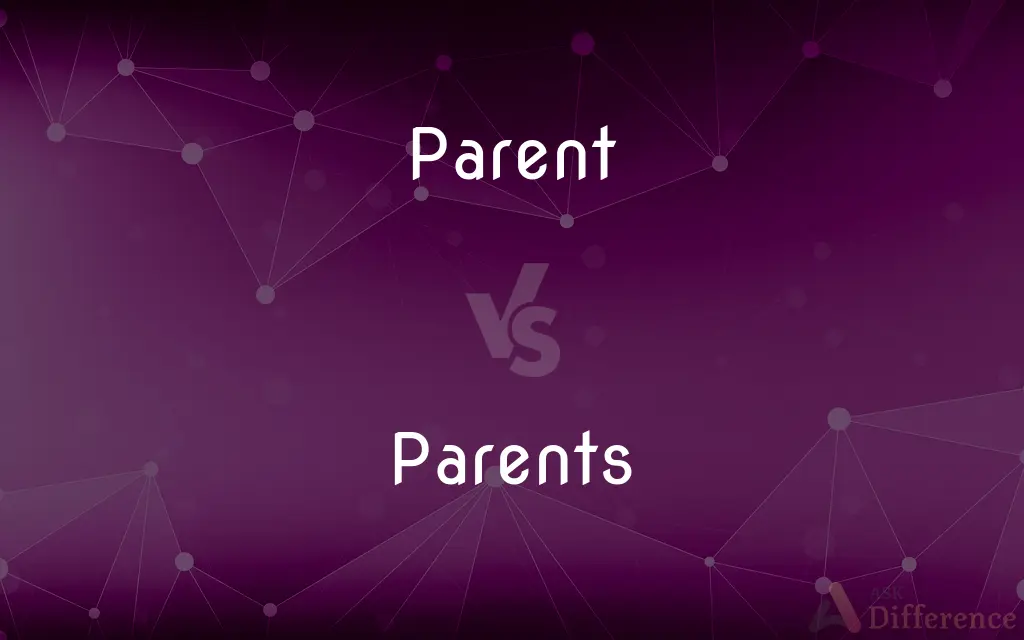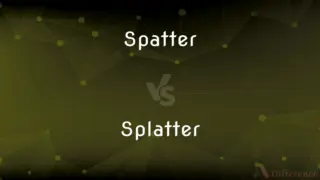Parent vs. Parents — What's the Difference?
Edited by Tayyaba Rehman — By Maham Liaqat — Updated on March 19, 2024
"Parent" refers to a single guardian, focusing on the individual's role, while "parents" denotes a pair, emphasizing the collective responsibility in child-rearing.

Difference Between Parent and Parents
Table of Contents
ADVERTISEMENT
Key Differences
A "parent" can be a mother or a father, focusing on one individual's responsibilities, decisions, and relationship with a child. This term is used when referring to the role or actions of one guardian, highlighting the unique contribution of a single caregiver. On the other hand, "parents" collectively refers to both the mother and father or two guardians, emphasizing their joint responsibilities, decisions, and the shared aspects of child-rearing.
In legal and formal contexts, "parent" is often used to specify the involvement or rights of one guardian, which can be crucial in situations like custody agreements or medical decisions. Whereas "parents" is used when laws, rights, or responsibilities pertain to the combined guardianship or when both are being considered together.
Culturally, the term "parent" can be used to acknowledge and respect the role of a single caregiver, especially in situations where one is raising a child independently. "Parents," however, reinforces the concept of a family unit or dual guardianship, highlighting the collaborative effort in raising a child.
In discussions about child development, referencing a "parent" may focus on the influence or actions of one specific guardian on the child's upbringing. In contrast, discussing "parents" often involves analyzing the dynamics and interactions within the family unit, including the combined influence of both guardians on the child's development.
Comparison Chart
Definition
Refers to one guardian, either a mother or a father
Refers to both guardians collectively
ADVERTISEMENT
Focus
Individual responsibility and role in a child's life
Joint responsibilities and shared role in child-rearing
Usage Context
Legal and formal situations, individual contribution
Family unit, cultural norms, combined guardianship
Cultural Implication
Acknowledges single caregivers, emphasizes individuality
Highlights the family unit, emphasizes collaboration
Impact on Child Development
Discusses the influence of one guardian
Considers dynamics and combined influence of both guardians
Compare with Definitions
Parent
A single mother or father involved in raising a child.
Every evening, the parent reads a bedtime story to their child.
Parents
A pair consisting of a mother and a father or two guardians.
The parents celebrated their child's achievement together.
Parent
An individual bearing responsibility for the care and upbringing of a child.
As a parent, making time for your child's activities is crucial.
Parents
Two individuals collectively responsible for raising a child.
The child's parents work together to provide a supportive environment.
Parent
One who brings up, cares for, or nurtures a child.
The parent attended every school event to support their child.
Parents
The combined guardianship of a child by both a mother and a father.
The parents attended the parent-teacher conference as a team.
Parent
An individual's guardian or caregiver.
The child's parent was called for a meeting with the teacher.
Parents
The collective influence of both a mother and father in a child's life.
The importance of parents in a child's development cannot be overstated.
Parent
A person who plays a significant role in the life of a child.
Being a parent requires patience and understanding.
Parents
A duo involved in the upbringing and care of a child.
The parents made a joint decision regarding their child's education.
Parent
A parent is a caregiver of the offspring in their own species. In humans, a parent is the caretaker of a child (where "child" refers to offspring, not necessarily age).
Parents
A female person whose egg unites with a sperm or a male person whose sperm unites with an egg, resulting in the conception of a child or the birth of a child.
Parent
A female person whose egg unites with a sperm or a male person whose sperm unites with an egg, resulting in the conception of a child or the birth of a child.
Parents
A female person who is pregnant with or gives birth to a child except when someone else has legal rights to the child.
Parent
A female person who is pregnant with or gives birth to a child except when someone else has legal rights to the child.
Parents
A person who adopts a child.
Parent
A person who adopts a child.
Parents
A person who raises a child.
Parent
A person who raises a child.
Parents
An ancestor; a progenitor.
Parent
An ancestor; a progenitor.
Parents
An organism that produces or generates offspring.
Parent
An organism that produces or generates offspring.
Parents
A guardian; a protector.
Parent
A guardian; a protector.
Parents
A parent company.
Parent
A parent company.
Parents
A source or cause; an origin
Despair is the parent of rebellion.
Parent
A source or cause; an origin
Despair is the parent of rebellion.
Parents
To act as a parent to; raise and nurture
"A genitor who does not parent the child is not its parent" (Ashley Montagu).
Parent
To act as a parent to; raise and nurture
"A genitor who does not parent the child is not its parent" (Ashley Montagu).
Parents
To cause to come into existence; originate.
Parent
To cause to come into existence; originate.
Parents
To act as a parent.
Parent
To act as a parent.
Parents
Plural of parent
I like hanging out with my parents, but my friends think it's weird.
Parent
A surrogate parent
Parent
A third person who has provided DNA samples in an IVF procedure in order to alter faulty genetic material
Parent
A person who acts as a parent in rearing a child; a step-parent or adoptive parent.
Parent
(obsolete) A relative.
Parent
The source or origin of something.
Parent
(biology) An organism from which a plant or animal is immediately biologically descended.
Parent
(attributive) Sponsor, supporter, owner, protector.
Parent
A parent company.
Parent
(computing) The object from which a child or derived object is descended; a node superior to another node.
Parent
(physics) The nuclide that decays into a daughter nuclide.
Parent
To act as parent, to raise or rear.
Parent
One who begets, or brings forth, offspring; a father or a mother.
Children, obey your parents in the Lord.
Parent
That which produces; cause; source; author; begetter; as, idleness is the parent of vice.
Regular industry is the parent of sobriety.
Parent
A father or mother; one who begets or one who gives birth to or nurtures and raises a child; a relative who plays the role of guardian
Parent
Bring up;
Raise a family
Bring up children
Common Curiosities
How does the role of a single parent compare to that of parents?
A single parent takes on the combined responsibilities typically shared by parents, often facing unique challenges and responsibilities.
How do "parent" and "parents" differ in usage?
"Parent" refers to one guardian, focusing on individual responsibility, while "parents" refers to both guardians collectively, emphasizing shared responsibilities.
Can "parents" include step-parents or adoptive parents?
Yes, "parents" can include step-parents, adoptive parents, or any two guardians responsible for a child's upbringing.
Can "parent" refer to non-biological guardians?
Yes, "parent" can refer to non-biological guardians who take on the responsibilities of raising a child.
Why is the distinction between "parent" and "parents" important?
The distinction is important for clarity in legal, formal, and social contexts, emphasizing either individual or joint responsibilities.
Do cultural perceptions of "parent" and "parents" differ globally?
Yes, cultural perceptions can vary, with some cultures placing more emphasis on the family unit and others on the role of individual caregivers.
What defines a parent?
A parent is an individual, either a mother or a father, responsible for the upbringing and care of a child.
Is the impact of "parent" vs. "parents" on child development different?
Yes, discussing "parent" might focus on the individual's influence, while "parents" looks at the combined effects and family dynamics.
How does the language of parenting impact societal norms?
The language of parenting, including the use of "parent" vs. "parents," reflects and can influence societal norms and expectations around family structures.
How does the term "parent" affect legal documents?
In legal documents, "parent" specifies the rights, responsibilities, or involvement of one guardian, while "parents" might refer to joint rights or responsibilities.
How do "parent" and "parents" relate to single-parent families?
In single-parent families, the term "parent" highlights the role of the one caregiver, while "parents" might be used less frequently unless referring to broader family dynamics.
Can a child have more than two parents in legal or social terms?
In some legal and social contexts, a child can have more than two people recognized as parents, reflecting complex family structures.
What role do "parent" and "parents" play in psychological studies on family dynamics?
In psychological studies, the terms help differentiate between the influences and roles of individual vs. combined guardianship on family dynamics and child development.
Are there legal implications in differentiating between "parent" and "parents"?
Yes, there can be legal implications, especially in matters of custody, inheritance, and parental rights, where the distinction is crucial.
How do educational systems accommodate single-parent and two-parent families?
Educational systems aim to accommodate both by recognizing the diverse family structures and ensuring inclusive communication and policies.
Share Your Discovery

Previous Comparison
Spatter vs. Splatter
Next Comparison
Glottis vs. EpiglottisAuthor Spotlight
Written by
Maham LiaqatEdited by
Tayyaba RehmanTayyaba Rehman is a distinguished writer, currently serving as a primary contributor to askdifference.com. As a researcher in semantics and etymology, Tayyaba's passion for the complexity of languages and their distinctions has found a perfect home on the platform. Tayyaba delves into the intricacies of language, distinguishing between commonly confused words and phrases, thereby providing clarity for readers worldwide.














































